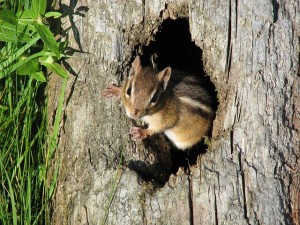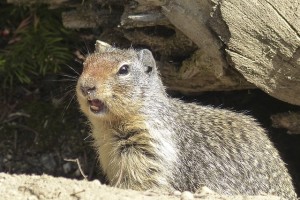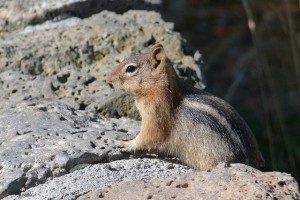Thanks to urban sprawl, chipmunks have adapted suburbia even though they prefer timber borders. Chipmunks are known to dig elaborate tunnels under flower beds, shrubs, trees, wood or rock piles and even porches and sidewalks. Ground squirrels favor open grasslands: think cemeteries, golf courses, and well-manicured lawns and create tunnels as well. And these tunnels are no joke. Some are as long as 20 to 30 feet with multiple points of entry, which makes it difficult to serve a permanent eviction notice.
Since it is much more difficult to get rid of chipmunks and ground squirrels once they move in, your best bet is prevent them from even considering it.
• This should be obvious, but do NOT feed them! If you feed them, they won’t want to ever leave.
• Clean up any spills from bird feeders quickly. Bird seed piled up on the ground is like a top-notch buffet to a ground squirrel or chipmunk.
• Put welded wire around deck openings and elevated sheds to prevent the critters from gaining entry.
• Install chimney caps. Yes, they can and will move into your chimney.
• These creatures are easily scared, so objects like inflatable beach balls, or plastic bags on sticks that will blow in the wind will frighten them away (until they get used to them).
• If you find a den, put lighting in it. Christmas lights, flood lamps, and bright flashlights work well. The best bet is to leave them on 24/7, but if you can’t, leave them on at night so their sleep is interrupted and unpleasant.
• Noise! Put an alarm clock, radio, or even a noisy toy in or next to their den. Again, 24/7 is best, but if that’s not possible then play it at night.
• If they make a den in your chimney, do NOT smoke them out. Place a radio in there and leave it on or lower a light down in it instead.






